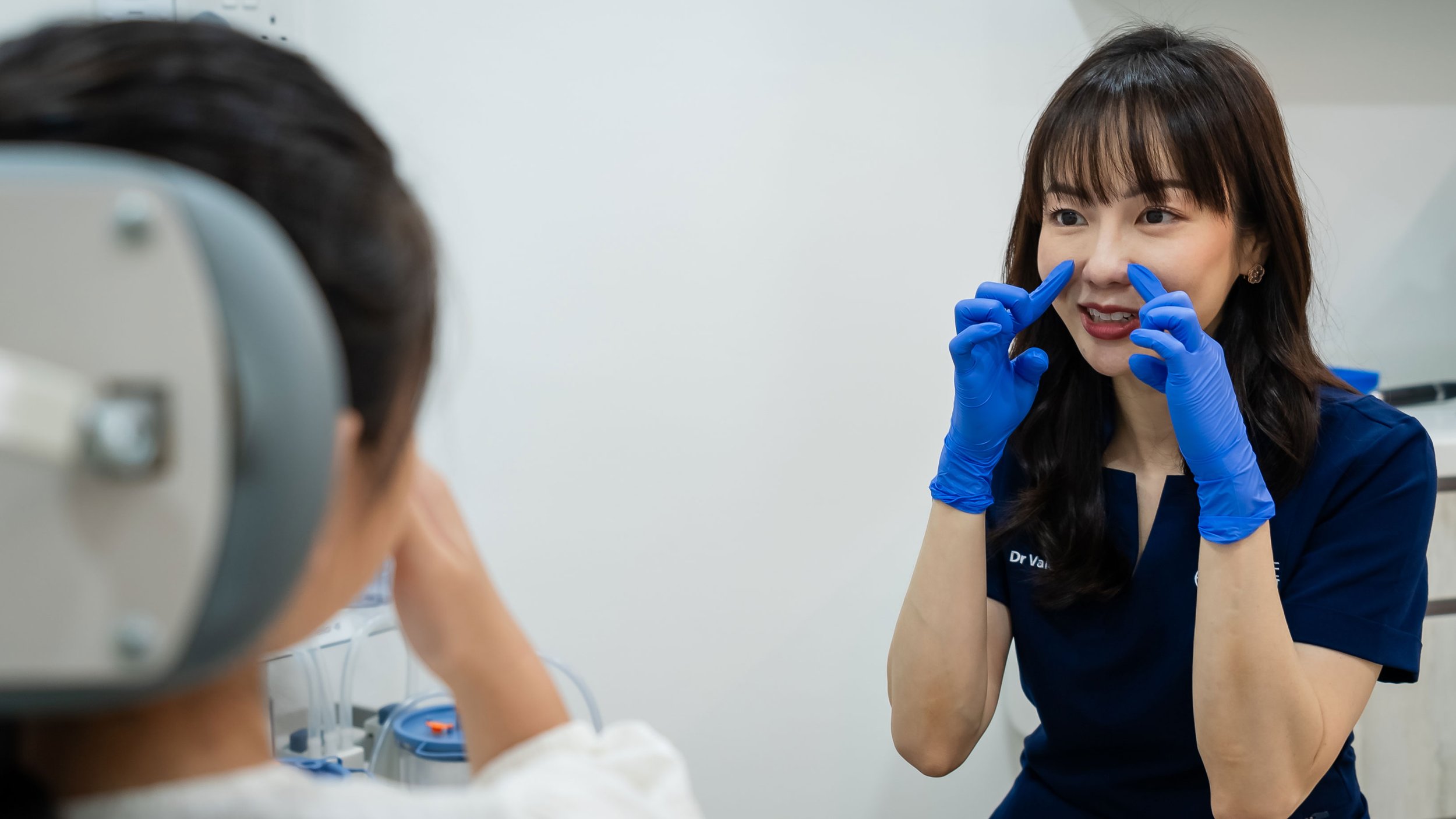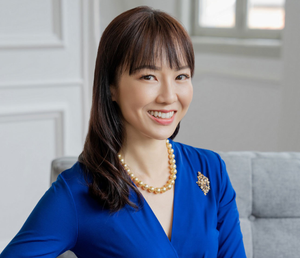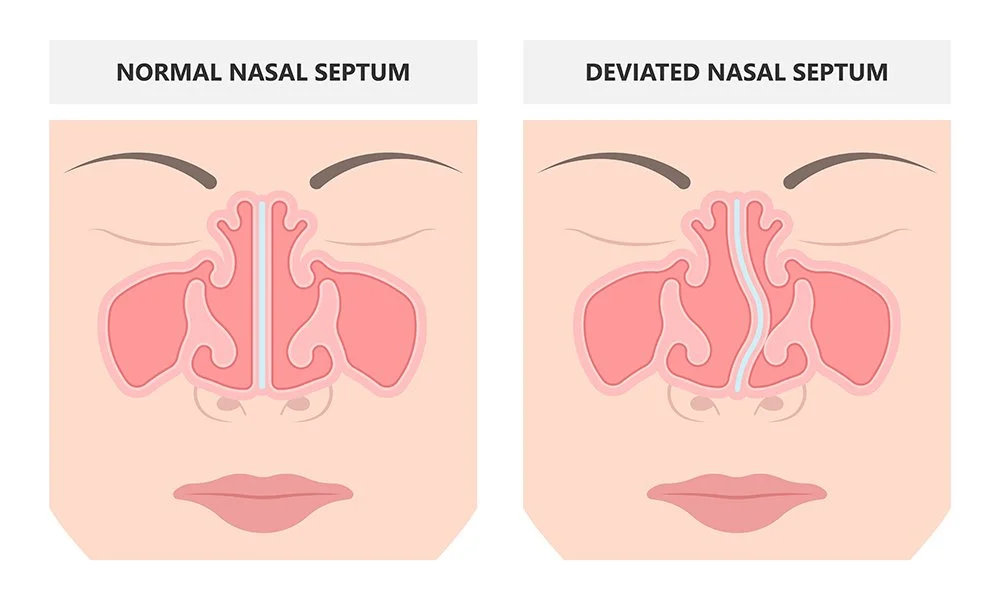
Deviated Nasal Septum in Singapore
Singapore's humid climate can often aggravate nasal issues like allergies or sinusitis, making early recognition of a deviated septum crucial. While many people have some degree of deviation, a more pronounced curvature can cause breathing difficulties, snoring, sinus infections, or poor sleep. Being aware allows you to seek timely evaluation and treatment from a specialist.
What Is a Deviated Nasal Septum?
Picture a thin wall that divides your nasal passages, like a centre line running down a road; that is the nasal septum. Ideally, it evenly divides your nose into equal passages. However, if this line swerves to one side, making one passage narrower, you have a deviated septum.
What Are the Causes of Deviated Nasal Septum?
Understanding whether a deviated septum is congenital or acquired helps guide treatment, especially when symptoms such as breathing difficulty or nasal congestion persist.
A condition present from birth
Some people are born with a deviated nasal septum due to irregular development in the womb. The septum may shift during foetal growth or result from a challenging delivery, especially in cases involving prolonged labour or the use of delivery instruments. This type of deviation is typically noticed early in life and may worsen as the face matures.
Acquired Conditions
Trauma to the face is a common cause of septal displacement. Whether from falls, contact sports, accidents, or physical altercations, even minor impacts can lead to misalignment, particularly in children with their more delicate nasal structures. Additionally, age-related changes in cartilage and bone may subtly shift the septum over time, even without obvious injury. This gradual drift can slowly impair nasal airflow.
Signs & Symptoms of a Deviated Nasal Septum
A deviated nasal septum often goes undetected. A majority of people with this condition do not experience any noticeable symptoms. However, if your deviated nasal septum is more pronounced, you might observe:
Difficulty Breathing – like trying to inhale through a straw due to blocked nostrils. This is especially noticeable when a cold or allergies cause your nasal passages to swell.
Frequent Nosebleeds – provoked by the drying out of the skin over the nasal septum.
Noisy Breathing While Sleeping – because of the turbulent airflow through the nose in the presence of a deviated septum
A Particular Sleeping Preference – favouring one side to breathe more comfortably, given the narrowing of one nasal passage
Facial Pain – can cause uneven airflow through the nasal passages, leading to pressure build-up in one or both sides of the face.
Restoring proper airflow can improve breathing, sleep quality, and even reduce your risk of other health issues linked to poor oxygenation during sleep. Contact us today to consult our ENT surgeon.
How Is a Deviated Nasal Septum Diagnosed?
Diagnosis typically begins with a thorough consultation and physical examination. Using a nasal speculum, your doctor will first check for visible signs of septal deviation and assess the condition of your nasal passages.
To get a more detailed view, especially if symptoms are significant or the deviation isn't clearly seen during the initial exam, a nasal endoscopy may be performed. This involves inserting a thin, flexible tube with a light and camera (endoscope) into your nose. It allows your ENT specialist to examine deeper areas of the nasal cavity and better evaluate the extent of deviation, any associated swelling, or other existing conditions like polyps or sinus drainage issues.
This in-clinic procedure is quick, well-tolerated, and provides valuable insight to guide treatment decisions.
What Are the Treatment Options for Deviated Nasal Septum?
We may first prescribe medications for symptom relief:
Decongestants to reduce swelling in your nasal tissue
Antihistamines to prevent allergy symptoms
Nasal steroid sprays reduce swelling in your nasal passage and help with drainage
Please note, these won't correct a deviated nasal septum but may reduce the symptoms. If medications do not help, you might need surgery.
Septoplasty - When medical management isn't enough to alleviate your nasal symptoms, you might consider a surgical procedure known as Septoplasty. This procedure involves the meticulous straightening and repositioning of your nasal septum. The level of improvement you can expect is directly related to the severity of your septum deviation. Complete relief from symptoms like nasal obstruction is possible. However, it's important to note that Septoplasty alone cannot cure other nasal or sinus conditions affecting your nose, such as allergies.
Septorhinoplasty - When your external nasal structure contributes to nasal obstruction and septum deviation, a different surgical procedure, known as septorhinoplasty, might be recommended. This involves modifying your nose's external bones and cartilage to change its shape or size.
What Are the Complications of a Deviated Nasal Septum?
A mildly deviated septum may not cause any problems. But when the deviation is more severe, it can lead to several complications, including:
Dry mouth
Snoring and noisy breathing during sleep
Magnified sleep apnoea symptoms
Frequent nosebleeds
Reduced sense of smell
Can You Prevent a Deviated Nasal Septum?
Not all cases of a deviated septum can be prevented, as some are present from birth or develop during early facial growth. However, the risk of acquiring a deviated septum due to trauma can be reduced by taking appropriate safety precautions. These include wearing protective equipment—such as facial guards or helmets—during contact sports and always using a seatbelt while in a vehicle.
If you suspect that a deviated septum is affecting your well-being and are looking for a trusted clinic, consider booking a consultation with a Singapore ENT surgeon.
Frequently Asked Questions
Do nasal strips help with a deviated nasal septum?
Nasal strips may offer short-term relief by widening the nostrils, but they do not correct the structural issues. If symptoms persist, surgery is the only long-term solution.
Can a deviated nasal septum lead to sleep apnoea?
A deviated septum does not directly cause sleep apnoea, but it can worsen airway obstruction and aggravate symptoms in those already prone to sleep apnoea. It may also interfere with the effectiveness of treatments.
Does a deviated nasal septum cause post-nasal drip?
Yes, a deviated septum can contribute to post-nasal drip by disrupting mucus drainage.
What food can you eat after deviated nasal septum surgery?
After deviated nasal septum surgery, avoid spicy, crunchy, or hot foods, as well as caffeine, alcohol, and anything overly salty or processed, which can delay healing and increase swelling. Otherwise, a healthy, balanced diet will be sufficient.
Our ENT Surgeon
Dr Valerie Tay
Senior Consultant ENT Surgeon
MBBS (S’pore), MRCS (Edin), MMed (ORL), FAMS
Dr Valerie Tay is a Senior Consultant ENT Surgeon in Singapore with a strong focus on nasal conditions such as deviated nasal septum, allergic rhinitis and sinus conditions. She frequently manages complex nasal obstruction that stems from nasal septal deviation. Beyond clinical work, Dr Tay has played a significant role in shaping ENT training as a former President of the ENT Society and core faculty member of the National Health Group (NHG) residency programme. She continues to share her expertise through workshops and conferences to advance patient care in the field.
Don't let ENT conditions hold you back.
Connect with us at Aspire ENT clinic today, and take the first step towards a better quality of life.
If you are experiencing any concerns related to your Ear, Nose, or Throat health, contact us at Aspire Ear, Nose Throat and Snoring Clinic. Dr Valerie Tay is here to help you breathe well, sleep well, eat well, and live well.
Aspire Ear, Nose, Throat and Snoring Clinic
Mount Elizabeth Medical Centre #06-10,
3 Mount Elizabeth, Singapore 228510
Opening Hours (by appointment only)
Monday to Friday: 9 AM to 4.30 PM
Saturday: 9 AM to 12 PM
Sunday and Public Holidays: Closed
Contact Details
Tel: +65 6592 2118
Mobile: +65 9358 8060
Email: enquiry@aspire-ent.sg




